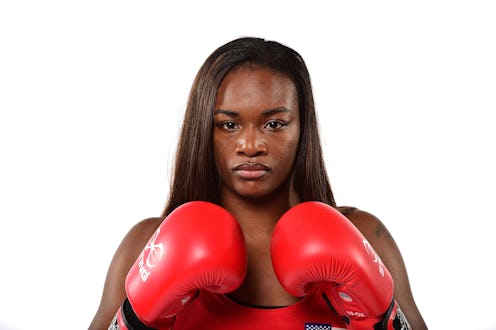News
Claressa Shields Explains Her Lack Of Endorsements
Olympian boxer Claressa Shields has a true underdog story. She hails from Flint, Michigan, one of the most dangerous cities in the country, survived a troubled childhood, and overcame skeptics who doubted her ability to participate in the sport at all (including those in her own family) to become the first woman to compete in and win a gold medal for Olympic boxing. Yet this story, like those that often fill Olympics coverage, has not translated into any financial earnings for her. Shields' endorsement explanation — trying to make sense of why she's been slow to receive the endorsements that other Olympians typically get — reflects a sad but true reality for women who fall outside the "acceptability" line.
Shields' victory as the first woman to win a gold in Olympic boxing should have been enough to secure some endorsement deals. That win, after all, made history. Until the 2012 London Olympics, women were barred from competing in boxing at the Games. Shields' gold medal symbolized dedication to a sport that constantly told her that she wasn't good enough to compete at the Olympic level.
But following her win, things didn't change. She returned to Flint to live with her coach, as her home life was too unstable. The meager earnings she got from the win went to help with a brother in prison and to pay her mother's water bill. As for the lack of endorsements from athletic companies like Nike, Shields had a sad explanation: "I wasn't the ideal woman. I wasn't the pretty girl who wears her hair straight," she told NPR journalist Sue Jaye Johnson. "I don't know. I guess I wasn't what they were looking for."
Upon returning to her first tournament, U.S. Boxing officials laid the groundwork for a public relations strategy: Stop talking about how she likes to beat people up. "I box," she informed them. But it was no matter — in the officials' eyes, Shields didn't fit the image of an Olympian, which she further explained to NPR:
Their definition of a woman — you can be tough, but not too tough. If I want to get in there and kick a girl's ass, I'm going to kick her ass. That's it. You might as well have told me to start punching my opponents a little softer so girls won't feel so threatened.
But she hasn't let the lack of endorsements deter her. Shields has been training for the last year at the Olympic Training Center in Colorado, and she told NPR that she hopes to move her family to Florida after Rio.
Her goal has stretched beyond getting a medal, too. Shields said that she believes she can use her time at the Olympics to channel another previously disregarded boxer, Muhammad Ali, to make the world understand that women in boxing is not something to be feared, but celebrated. She told NPR: "In Rio, what's going to happen [is] everybody's going to be talking about that girl, Claressa Shields, can fight."
Shields will be taking that fight — one that has morphed into something both personal and political — to the ring on Aug. 17, where she will compete for the United States in the boxing quarterfinals. This time, she plans to show those endorsement executives just what she's made of.
